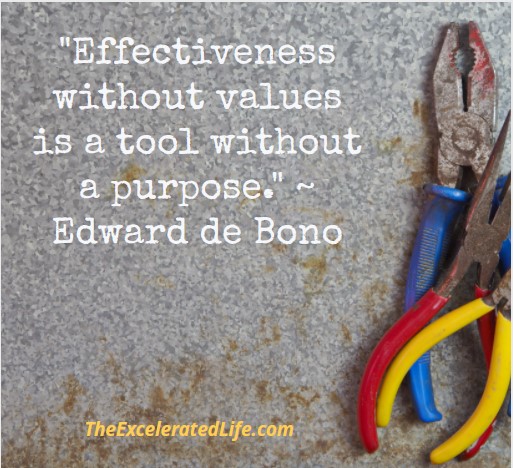When your values are clear, you make better decisions. Using your values in decision-making is another way to live out your values. If you don’t use your values to guide your actions, then they cannot help you. So put your values to use when you have a decision to make.
TheExceleratedLife.com
Title Photo by Tima Miroshnichenko from Pexels
Who Would You Help First?
Imagine you are driving your two-seater car along a deserted road during a blizzard. [1] (Why you’d be driving in a blizzard is a longer discussion for another day!) Suddenly you round a curve and see another car that has slid off the road and into a tree. You stop to help and you discover there are three people in the car. Luckily none of them are injured, just stranded. Interestingly enough, the three people are:
- an old friend, who once saved your life.
- your childhood sweetheart, who is your greatest lost love.
- an elderly lady.
No one has cell phone coverage and the possibility of anyone else driving by is slim to none. The conditions make it too dangerous to walk anywhere and there’s no chance of towing the damaged car. It’s an hour’s drive to the nearest town.
Now, given that your car is a two-seater and you can only carry one person at a time, in what order will you drive these stranded people into town?
Values-Based Decisions
If you are struggling with this dilemma, or merely curious as to how you would choose, may I suggest considering your values?
“When your values are clear to you, making decisions becomes easier.” ~ Roy E. Disney
When you make decisions based on your values, you make better decisions and decision making becomes easier. “Your decisions directly influence how you spend your precious resources–time, money, and energy,” Lee Colan writes. [Colan] And to live in harmony with your values, you want to use those precious resources in accordance with what you value. In fact, choosing from a values-based perspective leads us to “prefer the consequences of one alternative decision over another.” [“Decision Chain Element”]
Clayton M. Christensen writes in How Will You Measure Your Life?: “most of us will face a series of small, everyday decisions that rarely seem like they have high stakes attached. But over time, they can play out far more dramatically.” [Christensen] So, while it’s helpful to make values-based decisions for the large questions, it may be even more important to do so for the small, everyday choices.
When You Decide Based On Your Values
As we discussed earlier, when values are clear, you make better decisions and they become easier to make. Here are some reasons why this is.
Sometimes, decisions are difficult because none of the alternatives meet all the criteria we’ve set. Making a decision like this requires trade-offs. If you know your values – and their priority – you can choose the alternative that best fits your most important values. Plus, “aligning decisions with your values also ensures clear thinking about the consequences of those decisions – good or bad.” [Colan]
Value-based decision-making reduces the stress and pressure of making the “right” decision in this moment. “When you hold your options or choices up to the mirror of your values, the right choice quickly becomes obvious.” [Colan]
When you rely on your values in decision-making, and you are clear on what your values are, your choices are more limited. This is beneficial on a number of levels. For example, if you value integrity, then you don’t choose to cheat on your taxes, to fudge your timesheet, or to overcharge your customers. [Price] In fact, this “choice” never even comes up for you.

Practices For Values-Based Decisions
The first practice is to be clear on what you value. If you don’t know or aren’t sure, see the values clarifying exercise under “What Do I Do Now?”.
When you have a decision to make, use these tools and good practices. [“Decision Chain Element”]
- Make a list of possible outcomes for each alternative.
- List the things you care about regarding the outcomes.
- Write down what you like and dislike about each possible outcome.
- Weigh the wants you would be willing to give up in order to reduce the parts you dislike.
And avoid these traps. [“Decision Chain Element”]
- Short-term thinking: putting too much emphasis on the short-term (immediate gratification) while underemphasizing long-term effects.
- Not considering how your decision will affect those you love and care about.
- Overreacting to risks.
- Ignoring risks.
- Deciding based only on the current problem.
Making Values-based Decisions Day By Day
Suppose you are offered a position with another company. The new job offers a substantial increase in salary, but it is an additional hour away from your home. So you’ll add two hours to your daily commute, time you will be taking away from your family. What do your values advise you to do?
Or your desire to live a long, healthy life prompts you to consider getting up an hour earlier to hit the gym. But then the alarm goes off at 5:00 AM. What do your values say you’ll do?
Let’s go back to the story of the stranded passengers in the wrecked car. Based on your values, who do you rescue first? Second? Last? If you value loyalty, you might choose to rescue your old friend first. If you value compassion more, you’d likely help the elderly lady first. And if you value romance, well, there’s your lost love.
Do you see how it can be helpful to know your values and, importantly, their priority?
What Do I Do Now?
As we’ve just seen, clarifying and prioritizing your values is an important first step. If you need help with this exercise, try the Valid Values Excelerator.
Practice values-based decision-making. When your values are clear, you make better decisions in the short term and in the long run. You’ll likely have to consciously decide to use this at first, but if you can consistently make decisions based on your values, the process becomes more natural to you.
Make Better Decisions
When values are clear, you make better decisions and they become easier to make. If you want to make better decisions, try these actions.
- Use the Valid Values Excelerator or The Excelerator JumpStart – Excelerated Values™ to clarify values. The Excelerator is an in-depth exercise for clarifying your values and putting them into action. The JumpStart provides quick actions you can take right now to JumpStart your ability to begin defining and living your Valid Values.
- Think of a decision you’re facing or that you’ll need to make soon. Plan now how you’ll use values-based decision-making to practice your new skill.
- Review, after you’ve made a values-based decision. Did you make a good decision? (Note: not the “right” decision but one you can live with and that reflects your values.) Was it easier to decide?
Using your values when you need to decide something isn’t some gimmick to glide through decision-making. It’s another way to live out your values. If you don’t use your values to guide your actions, then they cannot help you. So put your values to use when you have a decision to make. That is embracing your Excelerated Life™!
Excelerated Values™ – defining and living your Valid Values – is one step in creating your Excelerated Life™, a life of flourishing and well-being, and a life of meaning, purpose, and service.
Read more about the Excelerated Life™.
Footnotes:
[1] I adapted this example from a story on the BusinessBalls website.
https://www.businessballs.com/amusement-stress-relief/stories-analogies-and-fables/#-stranded-car-dilemma
Resources:
Colan, Lee. “A Lesson from Roy A. Disney on Making Values-based Decisions.” Inc. Mansueto Ventures, July 24, 2019. Web. January 1, 2022.
https://www.inc.com/lee-colan/a-lesson-from-roy-a-disney-on-making-values-based-decisions.html
Christensen, Clayton M. How Will You Measure Your Life? New York: HarperCollins Publishers Inc., 2012.
“Decision Chain Element – Clear Values.” Decision Education Foundation. Decision Education Foundation,. Web. January 1, 2022.
https://www.decisioneducation.org/good-decision-chain-clear-values
Price, Tim. “When Your Values Are Clear, Your Choices Are Easy.” timpricebolg. timpricebolg, September 29, 2020. Web. January 1, 2022.
https://www.timpriceblog.com/when-your-values-are-clear-your-choices-are-easy/


